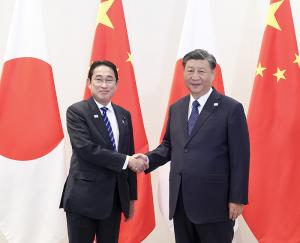LONDON, UNITED KINGDOM, November 28, 2023 /EINPresswire.com/ -- The meeting on 17th November between Chinese President Xi Jinping and Japanese Prime Minister Fumio Kishida during the Asia Pacific Economic Cooperation (APEC) summit in San Francisco highlighted China’s increasingly nuanced position on the matter. This development coincides with Japan’s completion of the third release of Advanced Liquid Processing System (ALPS) treated water from its Fukushima Daiichi Nuclear Power Station (FNDPS) into the Pacific Ocean on 20th November and may be an indicator to China’s growing trust in Japan’s operation.
Despite the treated water release progressing successfully, Japan's seafood producers continue to suffer from China’s decision to ban all Japanese seafood imports in response to the discharge, which began in August 2023. During diplomatic talks at the recent APEC, Prime Minister Kishida urged President Xi Jinping to lift the seafood ban during their meeting, and underscored the need for a joint commitment to "find ways to resolve the dispute through meetings and dialogue in a constructive manner."
One notable development is the joint decision to convene a meeting of scientific experts from both nations to discuss the Fukushima water release. While this marks a positive step towards a science-based resolution, no specific timetable for lifting the seafood ban was established during the discussions.
China's recent participation in a safety review from 16th-23rd October mission by the International Atomic Energy Agency (IAEA) also stands out. The mission, consisting of scientists and international scientific observers from 11 countries, collected marine samples near the Fukushima Daiichi Nuclear Power Station. These samples will be crucial in corroborating Japan's environmental monitoring efforts and evaluating the country's technical capabilities.
While these events are evidence of China's growing willingness to adopt a science-based approach in its response to the treated water release, these have not yet resulted in any material changes to China’s policy. In this context, China’s persistence with its seafood ban despite the scientific consensus to which its own scientists have contributed might be perceived as a tool for geopolitical leverage, potentially amounting to economic coercion. China’s recent decision to also ban the import of ornamental Koi fish, despite them being freshwater fish that are not typically imported for human consumption, further undermines China’s attempts to justify its ban due to health and safety concerns.
The question of China’s compliance with international trade agreements, including the World Trade Organization (WTO) agreement and free trade agreements between Japan and China, looms large. The ban on Japanese seafood imports, ostensibly for the protection of Chinese citizens from radioactive contamination, must align with scientific grounds and evidence, as stipulated by the WTO Sanitary and Phytosanitary (SPS) Agreement. It appears as if China has failed to comply with this requirement.
As the world watches, both nations are urged to navigate the delicate balance between geopolitics, economic concerns and the pursuit of scientifically sound resolutions. The upcoming meeting between scientific experts and continued diplomatic efforts hold the potential to pave the way for a constructive and mutually beneficial resolution to the question of the treated water release and the adjacent ban on seafood. In doing so, there is an opportunity to forge a path that eases regional tensions and safeguards the well-being of those individuals whose livelihoods are intricately woven into the fabric of these geopolitical decisions, such as the local Japanese fishermen who have so far been directly impacted.
Paul Clay
Oceanic Focus
info@oceanic-focus.com




